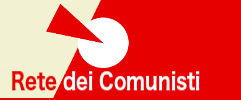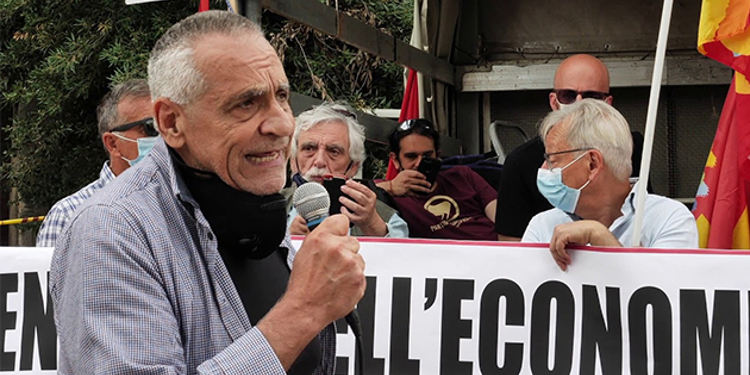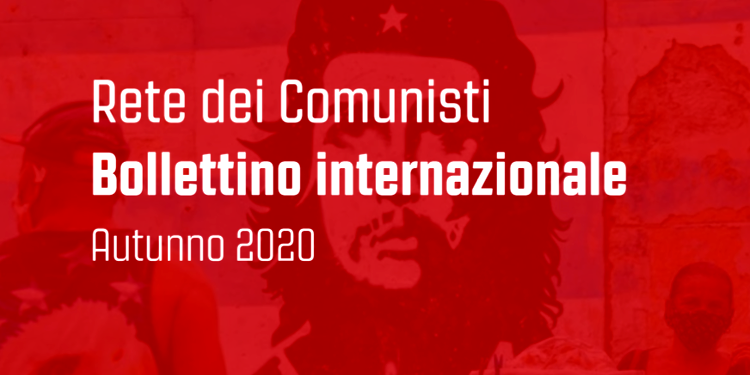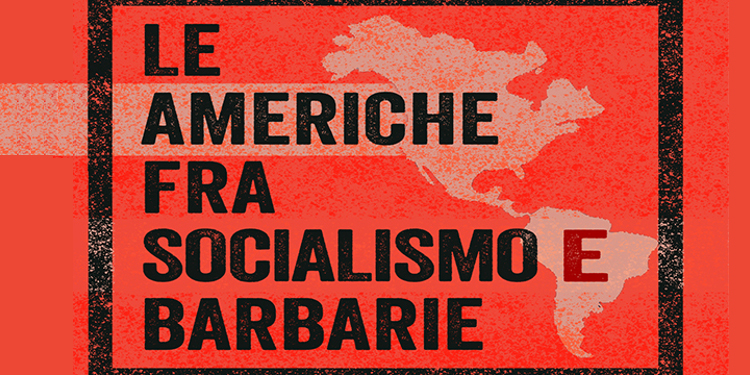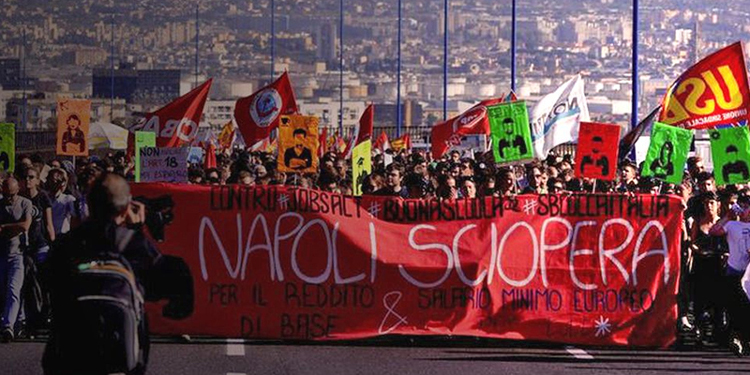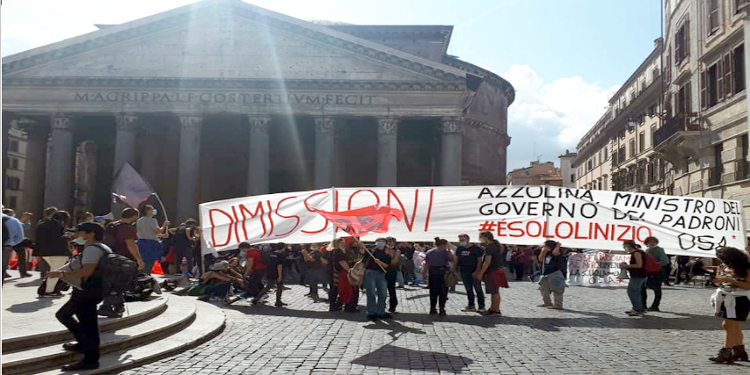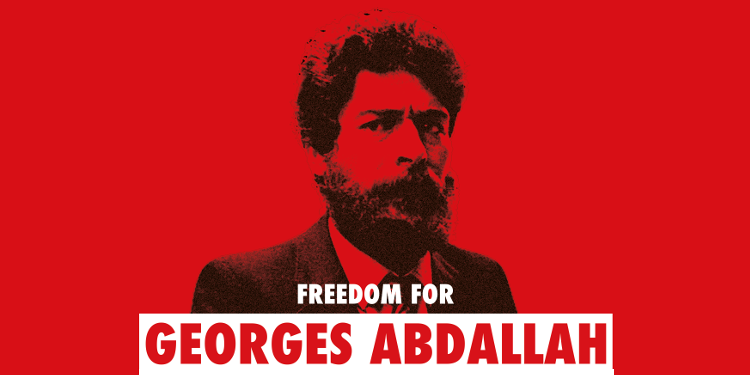| english | español | français | italiano
Mauro Casadio, Rete dei Comunisti
We meet with Mauro Casadio – of the Rete dei Comunisti – and we ask him some questions which we deem helpful to make an analysis about the strategic discussion concerning the new political phase and the novelties deriving from the persistence of the pandemic crisis and from the accentuation of the factors of global competition.
QUESTION: The approaching autumn will be a complicated and complex time span. A new and unprecedented condition in Italy and beyond. The persistence of the Covid pandemic crisis, the material effects of the crisis that will begin to manifest itself beyond the interventions / buffer by the states and the marked resumption of the factors of global competition between the world powers are characterizing this period. At the same time, however, the distortions, irrationality and limits of the capitalist development model emerge with more clarity. How much can the Socialist perspective – i.e. the need to break these social relations – benefit, albeit in tendency, from an historical and political conjuncture of this type?
ANSWER: We have been talking for some time about the systemic crisis of the Capitalist Mode of Production and what is emerging is precisely the character of this crisis. The defeat at the end of the twentieth century did not remain without consequences even for capital, certainly they benefited from the quantitative possibilities for growth that opened following the collapse of the USSR and the opening of the Chinese market worldwide, but the tendency of capitalism to grow today it is confronted again with those limits that were thought to be the responsibility of the communists and which instead are deeply structural of the present mode of production. The hatred of our class enemy has raged over the last thirty years not only on the exploitation, here and now, of the workforce but also against the social gains that the workers’ movement has torn up with international struggles in the 1900s. It is certainly no coincidence that the crisis starts from the destruction of the welfare state, healthcare but also schools, transport, in short, where capital has made unbelievable profits is at the source of a crisis of the system but also of civilization. If this is the reality, it is not difficult to foresee that the need for change, for the revolution, will be increasingly urgent, although not necessarily starting with the imperialist countries as globalization has built productive and financial ties that are difficult to sever.
QUESTION: The Communist Network in analyzing the dynamics of the inter / imperialist clash has recently used the word ‘stalemate’ to highlight the current dynamics in terms of comparative indices (financial, economic and military) between the various imperialist poles. A stalemate which – as clearly clarified in the conference [‘The Stalemate of Imperialisms’] that we organised in the last autumn to which we refer for further information – does not mean that the contradictions do not continue to grow and put pressure on the general situation by continuing to incubate and accumulate social matter. On the basis of this international situation and the accelerations that the global pandemic is causing, how do you think the dialectical link between the ’stalemate’ and the objective politicization of the entire arc of contradictions that powerfully feed into this context can be interpreted?
ANSWER: As historically has happened, capital has the historical merit of developing the productive forces to the maximum of its possibilities by breaking ties and snares and also the borders of national states. This accelerated process in the last thirty years has allowed the development not only of the imperialist countries but also of many other state subjects, starting with China. In essence, that interdependence, hoped for and favored by the crooked Gorbachev at the end of the 1980s, has come true, but is now showing its poisoned fruits for the “winners”. This has happened above all on the financial level, which has linked creditors and debtors, the world stock exchanges and financial funds, producing an interconnection from which no country can call itself out, as demonstrated by the 2007 crisis. It clearly also happened for the production system, interconnected at a world level, and it also happened for the military sector, where the development of productive forces and networks has made the armament, including nuclear weapons, available to countries that previously could not take this step. The ensemble of these ties is the rope on which imperialism is hanging itself for the affirmation of a binding condition for all. This is the stalemate, that is, the impossibility of breaking the overall balance of the balance of power that exists today worldwide. This balance produces the acceleration of the phenomenal forms of global competition, resulting in instability but not solutions. Another effect is the politicization of the clash between imperialisms and between classes, since positive possibilities of generalized growth are nowhere to be seen in this clash, even class sectors that are now powerless and saw a worsening of their rights and living conditions are also involved.
QUESTION: In recent years, the Rete dei Comunisti (RDC) has worked systematically and with various modes of intervention in the various fronts of the class struggle. On a strategic level, the RdC has kept alive the red thread of a theoretical elaboration of high quality to substantiate the validity of a requalified organized communist subjectivity adequate to the tasks of the 21st century. On the side of the political, social and trade union struggle, the RDC militants have made a contribution to the development of independent and class-rooted syndicalism and on the level of political representation of the interests of the popular sectors they contribute to the construction of a political / social experience in clear discontinuity with the old world of the “left” increasingly subordinate to capitalist compatibilities. In light, however, of the structural changes in progress and of an – objective – acceleration of the political and social contradictions what new strategic (and operational) positioning should the Rete dei Comunisti take in order to better fulfill the function of a modern Communist Organization in a country like ours?
ANSWER: As a political formation we have always kept our feet on the ground, a characteristic that has made us acquire forces and organization over time, we have not had vain antagonistic ambitions and we have always measured the possibilities with the characters, positive or negative, of conflict and relationships of strength between the classes in our country at different historical moments. We know well that we are in an imperialist pole, the EU, which has a strong possibility of orientation and hegemony even among our class but, despite the billions that central banks are pouring out worldwide, we see that the historical contradictions of capitalist development are coming out of the Marxist books and are manifesting themselves in reality. The setback that Cuba and China have given the West over the coronavirus affair is the materialization of a ghost that the ruling classes and reformists would have preferred not to see. So the need for radical change reappears, and it could only be so, but this must bring into play a new variant which is a new political subjectivity, adequate to the current historical context, which must break with the degenerate history of the left and it must retrain the objective of how to proceed towards socialism. The RdC is certainly not a candidate to lead such a process, knowing our limits well, but it certainly wants to move decisively in this direction by working on the strategic objective of the accumulation of social, political and theoretical forces to help give life to a subjectivity that it will have to be able to collect the contradictions that the current social order is increasingly manifesting.
QUESTION: On the 20th and 21st of September, Italian citizens were called to vote on a referendum on a constitutional amendment previously approved almost unanimously by the political forces: the cut in the number of parliamentarians in the Chamber of Deputies aimed at further reducing political representation in Parliament. As the polls had amply indicated, the ‘yes’ won with a large margin – almost 70%. How to explain this figure, in light of the overwhelming victory in the 2016 referendum against the “Renzi-Boschi” constitutional reform, which went in the same direction?
ANSWER: The referendum carried out has a double reading, the first is the one that saw the question voted in four institutional steps and with the change of government in August 2019, which led to the exit of the League and the entry of the PD – tough with the same Prime Minister. Even the PD, which first opposed the idea of making this part of the new coalition agreement, agreed to first vote the cut in the Parliament and then give an official indication to vote YES in the Referendum. Therefore, the almost unanimous indication of the parties was to vote YES to the cut of the parliamentarians.
In addition to the opposition of the left and also ours with the indication to vote NO, it must also be said that the Italian establishment has put in place all the information tools (La Repubblica, Il Corriere della Sera of FIAT / FCA, televisions and other newspapers) to vote NO, as the presence of the M5S in the government is an independent variable for them, even if it is now being normalized. This pronouncement of the “powerful” actually worsened the situation as in Italy the sectors of economic power have always had a poor capacity of electoral orientation. So we can say that the victory of the YES also has a second “anti-institutional” reading; for example, in all the large metropolitan areas the NO won in wealthy city centres and the YES in the suburbs in social crisis. In summary, it was a complex and contradictory vote, made in a context of COVID emergency, the meaning of which may be clearer in the next elections.
For the Renzi-Boschi Referendum the condition was completely different, that is, in a climate of normality, a clearly anti-system vote was expressed, a vote that had been prepared by the affirmations of the M5S first and followed by the vote in the League subsequently.
QUESTION: On 20th and 21st September there were elections also in some regions (Liguria, Tuscany, Veneto, Marche, Campania, Puglia) and in some municipalities. What are the most significant data coming from the polls, which together with the referendum outcome pave the way for the current Conte government – supported by the centre-left and by the M5S – projected to exercise its mandate until 2023?
ANSWER: This vote also has a contradictory character, as the force that led to the cut of the parliamentarians and won the Referendum, the M5S, was heavily penalized everywhere and the force that held was essentially the PD, except in the Marche region, which is not very relevant. While the League that aimed at the breakthrough had a political setback that will force it to review the behavior of the secretary Salvini and perhaps even to a change of line.
Much of the electoral choices that are made in this period are affected by the health emergency in which the regions and governors have played a role and therefore part of the causes are linked to the perceived need for stability by the “masses”. For this reason, all the most important governors have been more than confirmed in their role.
This stabilizing effect of COVID also affects the national government, which moved decisively at the beginning of the emergency, very differently from how other European countries did and this is being seen today, and will have over 200 billion euros available, and this is a very compelling argument for the electorate at least while it lasts. So the conditions of the government are solid but also this “solidity” lies within an extremely unstable European and international context that could change the situation and consequently also the electoral orientations.
15 settembre 2020
